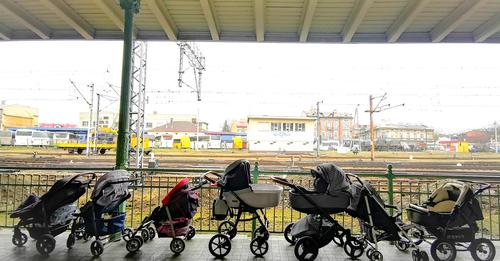Nőnap alkalmából köszöntöttem a Mozdulj, Debrecen! mozgalom mai, nagyerdei sétáján résztvevő hölgyeket.

A Nemzetközi Nőnap alkalmából örömmel osztjuk meg a KINCS Percek legújabb részét, melyből kideül, hogy jelentősen nőtt a nők helyzetét segítő intézkedések száma az elmúlt évtizedben! 



 Magyarországon az elmúlt évtizedben egyre több lehetőséggel élhetnek a nők annak érdekében, hogy össze tudják egyeztetni a családi és a munkahelyi feladataikat. A KINCS Percek ötödik része a Nemzetközi Nőnaphoz kapcsolódóan a nőket segítő intézkedésekről szól.
Magyarországon az elmúlt évtizedben egyre több lehetőséggel élhetnek a nők annak érdekében, hogy össze tudják egyeztetni a családi és a munkahelyi feladataikat. A KINCS Percek ötödik része a Nemzetközi Nőnaphoz kapcsolódóan a nőket segítő intézkedésekről szól.
 Míg a baloldali kormányok idején a 20 és 64 év közötti nőknek csak valamivel több mint a fele dolgozott és a munkanélküliségi rátájuk két és félszer magasabb volt a mostaninál, 2021-re már háromnegyedük foglalkoztatott volt, meghaladva az uniós átlagot. Egy évtized alatt legnagyobb mértékben azon édesanyák foglalkoztatása nőtt, akik három vagy több gyermeket nevelnek és jelentős volt az emelkedés a hat év alatti gyermeket nevelő nők körében is. Az iskolás gyermekek anyukáinak foglalkoztatottsága pedig ma már a 90%-hoz közelít.
Míg a baloldali kormányok idején a 20 és 64 év közötti nőknek csak valamivel több mint a fele dolgozott és a munkanélküliségi rátájuk két és félszer magasabb volt a mostaninál, 2021-re már háromnegyedük foglalkoztatott volt, meghaladva az uniós átlagot. Egy évtized alatt legnagyobb mértékben azon édesanyák foglalkoztatása nőtt, akik három vagy több gyermeket nevelnek és jelentős volt az emelkedés a hat év alatti gyermeket nevelő nők körében is. Az iskolás gyermekek anyukáinak foglalkoztatottsága pedig ma már a 90%-hoz közelít.
 A kisgyermekes nőknek a munka és a család összeegyeztetésében jelentős támogatást nyújt a gyermekgondozási ellátások rugalmas rendszere, a GYED extra, amely lehetővé teszi a gyermekgondozás melletti munkavégzést. A csecsemőgondozási díj, a CSED ma már a fizetés 100%-a, nettó összege magasabb, mint a korábbi fizetés. A gyermekgondozási díj, a GYED maximális összege pedig 2010 óta a minimálbér emelésének következtében több mint két és félszeresére nőtt, 102 ezer Ft-ról 280 ezer Ft-ra.
A kisgyermekes nőknek a munka és a család összeegyeztetésében jelentős támogatást nyújt a gyermekgondozási ellátások rugalmas rendszere, a GYED extra, amely lehetővé teszi a gyermekgondozás melletti munkavégzést. A csecsemőgondozási díj, a CSED ma már a fizetés 100%-a, nettó összege magasabb, mint a korábbi fizetés. A gyermekgondozási díj, a GYED maximális összege pedig 2010 óta a minimálbér emelésének következtében több mint két és félszeresére nőtt, 102 ezer Ft-ról 280 ezer Ft-ra.
 Segíti a nők munkavállalását a hároméves kortól minden gyermek számára biztosított óvodai nevelés, valamint a bölcsődék megújult és egyre bővülő hálózata. A bölcsődei ellátást biztosító férőhelyek száma 2010 óta 70%-kal növekedett, ma már az egy és három év közötti gyermekek harmada tudja igénybe venni a szolgáltatást.
Segíti a nők munkavállalását a hároméves kortól minden gyermek számára biztosított óvodai nevelés, valamint a bölcsődék megújult és egyre bővülő hálózata. A bölcsődei ellátást biztosító férőhelyek száma 2010 óta 70%-kal növekedett, ma már az egy és három év közötti gyermekek harmada tudja igénybe venni a szolgáltatást.

 In the past decade, women in Hungary could take advantage of more and more opportunities to reconcile their family and work responsibilities. The fifth part of the KINCS Minutes is about measures helping women on International Women's Day.
In the past decade, women in Hungary could take advantage of more and more opportunities to reconcile their family and work responsibilities. The fifth part of the KINCS Minutes is about measures helping women on International Women's Day.
 While under the left-wing governments only slightly more than half of women aged 20-64 worked and the unemployment rate was two and a half times higher than it is now, by 2021, three quarters were already employed, exceeding the EU average. Over the course of a decade, the employment of mothers raising three or more children has increased the most, and there has been a significant increase among women raising children under the age of six. The employment rate of mothers of schoolchildren is now reaching 90%.
While under the left-wing governments only slightly more than half of women aged 20-64 worked and the unemployment rate was two and a half times higher than it is now, by 2021, three quarters were already employed, exceeding the EU average. Over the course of a decade, the employment of mothers raising three or more children has increased the most, and there has been a significant increase among women raising children under the age of six. The employment rate of mothers of schoolchildren is now reaching 90%.
 Women with small children receive significant support in reconciling work and family through the flexible system of childcare benefits, the GYED extra, which allows them to work and continue to receive childcare support. The amount of the infant care free had been raised from 70 to 100% of the previous income in July 2021. Since 2010, the maximum amount of childcare allowance and GYED has increased more than two and a half times as a result of the increase in the minimum wage, from 102 thousand HUF to 280 thousand HUF.
Women with small children receive significant support in reconciling work and family through the flexible system of childcare benefits, the GYED extra, which allows them to work and continue to receive childcare support. The amount of the infant care free had been raised from 70 to 100% of the previous income in July 2021. Since 2010, the maximum amount of childcare allowance and GYED has increased more than two and a half times as a result of the increase in the minimum wage, from 102 thousand HUF to 280 thousand HUF.
 The provision of kindergarten education for all children from the age of three and a renewed and expanding network of public nurseries help women raising small children to return to the labour market. Since 2010, the number of nursery places has increased by 70%, and now a third of children between the ages of one and three can benefit from the service.
The provision of kindergarten education for all children from the age of three and a renewed and expanding network of public nurseries help women raising small children to return to the labour market. Since 2010, the number of nursery places has increased by 70%, and now a third of children between the ages of one and three can benefit from the service.
Nőnap alkalmából köszöntöttem a Mozdulj, Debrecen! mozgalom mai, nagyerdei sétáján résztvevő hölgyeket.

 TUDOD, HONNAN SZÁRMAZIK A “HIVATÁS AZ ÉLETÉRT” SZLOGEN
TUDOD, HONNAN SZÁRMAZIK A “HIVATÁS AZ ÉLETÉRT” SZLOGEN
Megtudhatod az Országos Mentőszolgálat podcastjából, amiben Mentő Petra beszélget Csillag Zoltán mentőápoló bajtársunkkal, a szlogen kitalálójával…

 Az Európai Bizottság alelnöke: Magyarország a történelem jó oldalán áll
Az Európai Bizottság alelnöke: Magyarország a történelem jó oldalán áll ️
️










ℹ️ Az elmúlt napokban én is a határon voltam és láttam, hogy példaértékű az a munka, amit a Segítségpontokon, a gyűjtőpontokon, az elszállásolási helyeken a kormányhivatalok, a rendőrség, a…

 Hatalmas információs zaj van az orosz-ukrán háborúban!
Hatalmas információs zaj van az orosz-ukrán háborúban!
 ️A háborúk jelentős részét ma már a képernyőkön, a kommunikációs hadszíntéren vívják.
️A háborúk jelentős részét ma már a képernyőkön, a kommunikációs hadszíntéren vívják.
👉A jelenlegi konfliktusban is mind a két oldal használja az…
A Fejér megyei…


Délelőtt a hazai nagybankok vezetőivel tárgyaltam.
A magyar bankszektor tőkeerős, tavaly rekordnyereséget ért el, mérlegfőösszege 16%-kal emelkedett, likviditása továbbra is magas.
A magyar bankokra a…

London, kezdünk! V4 miniszterelnökökkel.
